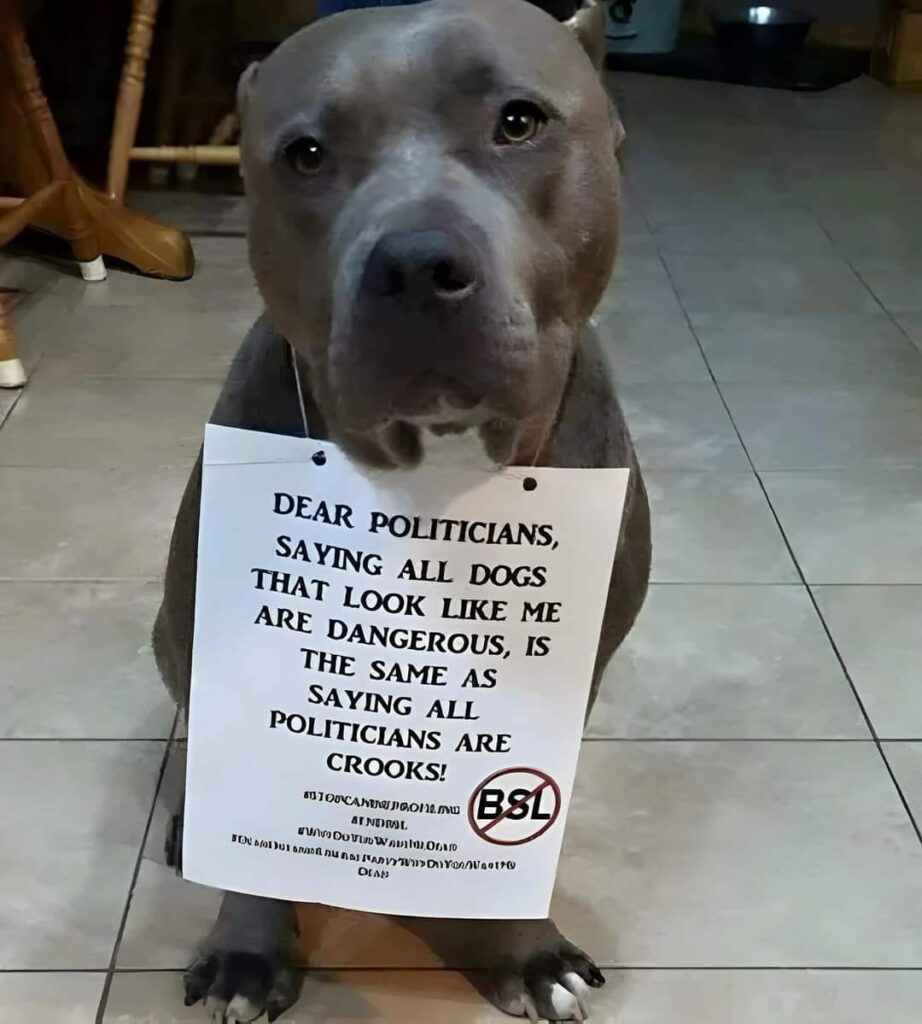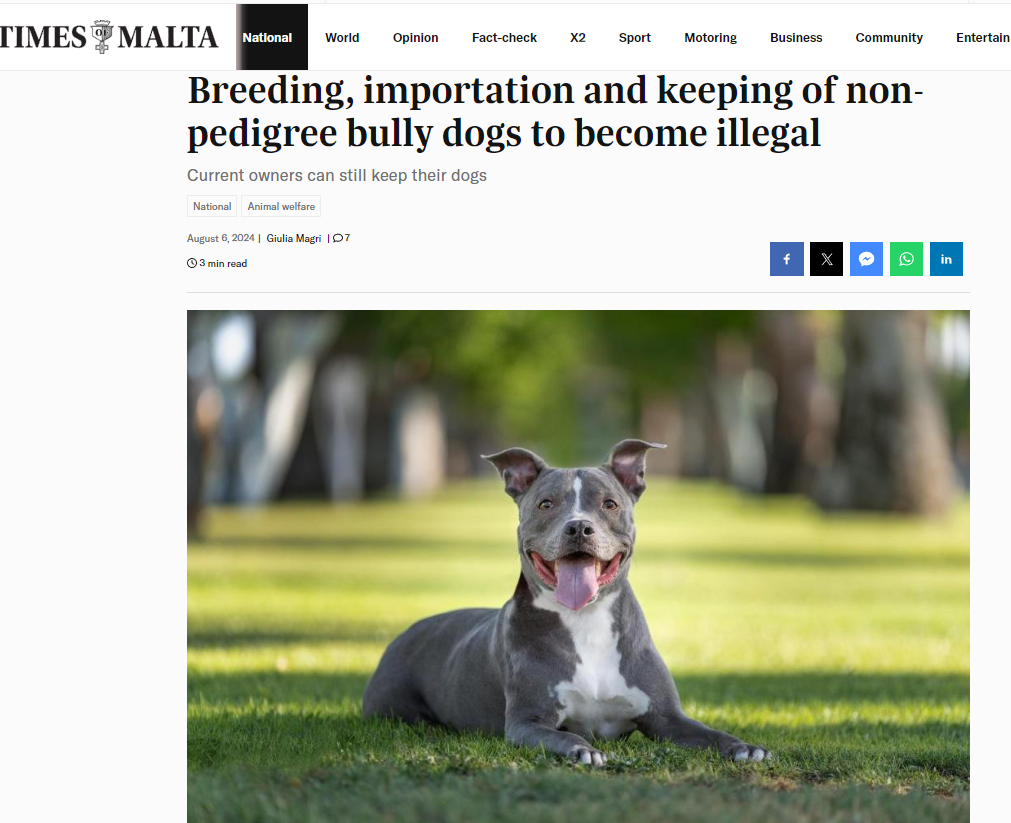The government has come up with a new legislation which will come into force in December. This legislation targets backyard breeders of bully-breed dogs, while, Joseph John Vella, the Animal Welfare director, said that “the regulation is not a complete ban on the breeding of bully-breed dogs” and that people can still buy “bully breeds if the dog is bred through a registered kennel club and is provided with a pedigree certificate.” The Animal Welfare Director should see that a registered breeder is not only reputable and meeting all the requirements, but that the dog s/he is breeding comes from a healthy line and that health and temperament tests and titling of the dogs they are breeding are done.
The law comes after animal rights activists, local sanctuaries and various NGOs “called for a temporary ban on the breeding and importation of the bully dog and described the breed as the ‘most abused, abandoned and neglected’ in the world.” Yes, but the media should also mention that it is part of the problem of why these dogs were given a stigma – each time a bully breed attacked a human, the attack was all over the media portals.
In response to this new legislation prohibiting the breeding and keeping of non-pedigree bully type dogs (2024-AW ACT CAP 439) there was a backlash from bully breed owners and others who are opposing the ban, while claiming that anyone who is supporting this, is not truly a dog lover and is discriminating against this type of breed. Another claim is that the implementation of Breed-Specific Legislation (BSL) is not the solution and that it is a short-term strategy which will make it worse for this breed.
I will not go into the merit of whether this temporary ban is the solution or not. On the one hand, I do understand the owners of bully breeds who felt discriminated upon. I also understand those who did not agree with this ban and with the petition given, so much so that currently, there is another ongoing petitition which is calling for responsible ownership, and the protection for responsible dog owners and their pets from the repercussions of misunderstood and misleading legislation.
I truly hope that this ban won’t turn into more bully breeds being surrendered, dumped outside, euthanised or even killed behind closed doors by their cruel owners. I hope that banning this discriminated breed won’t redirect backyard breeders to breed other breeds. What I would like to ask the Ministry is what will happen to confiscated bully breeds after December?
It is a shame for the incompetent politicians and the politically appointed employees to act when a renowned person is involved in an accident [I won’t mention more of this but I am sure the ministry knows what I am talking about!] When we had the story of a grandmother and her chihuahua being mauled by the pit bulls of the irresponsible breeder Andre Galea, no action was taken. Only when last year these dogs attacked and mauled Galea, were they confiscated. This site would like to know what has happened of this case and if Galea is breeding or keeping dogs again. Is it true that he is out and about and in possession of dogs again? Please read here.
Why was the person with confiscated bully breeds from Zebbug never mentioned in the media ? Who is this person? Are there any proceedings against him? Is he in jail?
Can we deduce that these people know someone who knows someone at the top or just directly know someone at the top and thus, they are never dealt with?
It is all well and good coming up with laws but my concern is that as usual, in this country of anarchy and the reign of the jungle, about which you can write a complete farce and re-enact it on stage, naqbdu l-affari minn sieqha.
First: the ban should be on breeders not on any breed. We all know how Malta went into phases of specific kind of breeds: dalmatians; pugs; rottweilers; german shepherds; huskies and so forth. So, the Ministry should be protecting all sorts of breeds from irresponsible breeders because whatever the overload of any breed that Malta and its sanctuaries will face, will pose a problem.
Second: Backyard breeders are the real problem here. So, it would be better for the Ministry to focus on breeding regulations and implementing controls for breeders with huge fines, court proceedings and any other sort of detriment for them.
Third: Why does the government first allow the black market to flourish, so that then the Maltese people will have to pay from their taxes to stop this black market which was allowed to flourish in the first place by the government! When are we going to stop peddling these idealistic ideas, where first the authorities create the problem, or allow the problem to be created, then abuse the taxpayers’ money to fight the problem that has been created by the authorities themselves, so that then another problem is created and then we use again the taxpayers’ money and the cycle continues? When will we start to solve the problems with realistic ideas so that they are solved once and for all? Will this ban create a worse future scenario for the bully breeds and other breeds?
Fourth: This ban will be ineffective without proper enforcement and regulation. Regardless of one’s position on the petition that was previously put up, it is important to pay attention to the laws that were passed because they will eventually determine how this issue is handled in the future. Local sanctuaries have been waiting for the new rules regarding the ownership and breeding of bully breeds, but they have the right to know exactly how they will impact rescue dogs as well as dogs who have not yet received microchipping.
Fifth: The word “exempt” is worrying because this would open the door for careless breeders to avoid paying fines by giving unwanted pets to shelters. The authorities must ascertain what will happen to adult canines that were seized following the prohibition and where they will end up. The new rules run the danger of making matters worse rather than better.
Sixth: Breed-specific restrictions in the past have resulted in higher rates of abandonment, ongoing careless breeding, and the transfer of undesirable patterns to other breeds. The new laws don’t adequately address the underlying reasons, even though they may lessen the quantity of litters produced unlawfully.
Seventh: Since certain breeds—such as English Bulldogs, Boston Terriers, and French Bulldogs—are not as commonly abandoned and don’t present the same concerns, we think that putting them all under the ban may be going too far. It is disheartening to see the chance for a responsible, public approach with temperament and health testing lost. We are aware that reducing the gene pool may impede attempts to alleviate the severe malformations and welfare of these breeds, even though we are not pushing for them to become the new standard.
Eighth: Kennel clubs must be assisted in improving their codes of behavior.
Ninth: The public must be exhorted to do extensive homework on breeders.
To protect the safety and welfare of all breeds as well as the community, the government’s focus should be on combating irresponsible breeding and ownership through ongoing education, behavioral assessment, tougher sanctions, and better enforcement that isn’t necessarily breed-specific.


